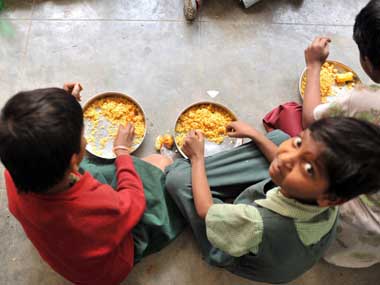Condemning the alarming neglect and continuing political indifference towards the midday meal programme, education experts and child rights activists are urging the government to clean up the rot in the system to avert another Bihar-like tragedy. Twenty-two children have died in a government primary school in Bihar’s Saran district after consuming contaminated mid-day meals. The Nitish Kumar government, however, has alleged that the meals were deliberately poisoned. Says Ambarish Rai, convenor of the Right to Education Forum, an umbrella group of civil society groups, “What has happened in Bihar is a prime example of how government schools are neglecting the programme. Why doesn’t this happen in the Kendriya Vidyalayas, or the Pratibha Vidyalayas, or unaided or aided private schools? It is because these schools are neglected and the children who go these schools are neglected… This is an attack on the dignity of children. This is an example of negligence of children because they come from the marginalised sections of society.” [caption id=“attachment_965191” align=“alignleft” width=“380”]  ‘You can’t treat school children like they were beggars. This is not charity. It is their right.": AFP image[/caption] Calling for institutionalising the preparation and distribution of mid-day meals instead of farming it out private contractors and NGOs or burdening teachers with it, Rai says, “If children are hungry, they cannot learn. The mid-day programme is a wonderful scheme and it is very necessary for our children. But the need of the hour is for it to be institutionalised. In states like Bihar and Uttar Pradesh, there is simply no mechanism to cook nutritious food and properly distribute meals. You can’t treat school children like they were beggars. This is not charity. It is their right.” Rai says implementation of the mid-meal programmes should involve the School Management Committees (which include parents and is mandatory under the RTE Act), Panchayati Raj Institutions and self-help groups. “Why are you burdening teachers with cooking mid-day meals. Let teachers teach. Build a separate mechanism. If you involve the community, if mothers of children are involved, they will ensure quality. Why not transfer responsibility to these committees?” [embedalsosee] A strong votary of the scheme, child rights lawyer Ashok Agarwal says corruption in the mid-day meal programme is compromising food quality, “The people who are supplying the food are running it for profit. And to make profit, they compromise on quality. Corruption is a big problem.” Pointing out examples of how schools flout prescribed safety norms, Agarwal says, “Teachers many a time don’t bother to check if the food is clean. As per norms, two teachers are supposed check the quality of the food before it is served to children. The manner in which the food is served is very often unhygienic. Older children are made to serve younger children.” Agarwal relates examples of how even in Delhi, the mid-day meal programme leaves much to be desired. He says, “Just today I got a call from a student from a school in Patparjanj who told me they found a rat in the mid-day meal. Recently, school children wrote to a Delhi high court judge telling him about iron pieces in their food. And the High Court, taking cognisance, is looking in to it and has asked the government and MCD to take action.” Asked why such an important issue such as mid-day meals continues to be ignored by politicians, Agarwal says, “Tell me, who are the ones who go to government schools. Not the children of the politicians or the bureaucrats. Our _neta_s don’t care about children in government schools.” Appealing to the Minister of Human Resource Development (MHRD) to get serious about the issue, Agarwal stresses that “When children are involved there should be no compromise.” The government must set up a high-level committee to review the implementation in the problem areas, says Rai. “The MHRD should take serious note of this. They should set up a committee comprising representatives from the National Commission for the Protection of Child Rights, the civil society and the judiciary. The high-powered committee should review those places where there are reports of meals being poorly served, so that the Bihar incident doesn’t repeat itself.” The quality of mid-day meals in Delhi was part of a survey that was released by youth initiative Joint Operation for Social Help (JOSH), in May, on the status of RTE implementation in Delhi. One of the students who participated in the survey and visited two slum clusters in Timarpur, North Delhi, speaking to Firstpost during an earlier interview had said, “Parents are not aware about quality of the mid-day meals that is being served or about the lack of cleanliness in the schools. Many said that children were carrying lunch and water bottles to schools to avoid the mid-day meals because there have been cases where students have fallen ill after eating the meals.” Says Saurabh Sharma of JOSH, “A lot of children complained that the mid-day meal was bad and that it wasn’t edible. Many children bring their own lunch boxes because their parents didn’t trust the food.” On why the mid-day programme didn’t register on the political radar, Sharma says, “If you can’t vote, you don’t figure in the political agenda.”
Activists say that what has happened in Bihar is a prime example of how government schools are neglecting the programme
Advertisement
End of Article


)

)
)
)
)
)
)
)
)



